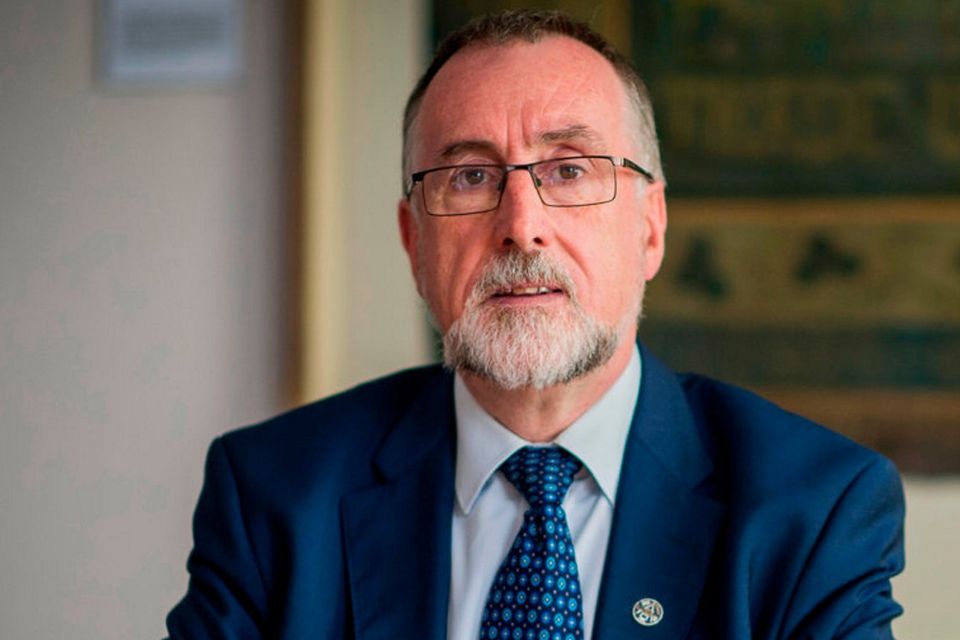Monday interview: 'Silence of 270,000 State employees is not a sign of weakness'
Anne-Marie Walsh speaks to Chairman of the Public Services Committee of the Irish Congress of Trade Unions Shay Cody
Shay Cody thinks a deal is possible within the terms of the Lansdowne Road Agreement. Photo: Doug O’Connor
A senior public sector union chief has said he does not believe that if a special deal were brokered for gardaí and teachers on pay cuts that it would stand up to a legal challenge.
The Chairman of the Public Services Committee of the Irish Congress of Trade Unions (ICTU), Shay Cody, said that immediate restoration of pay is not possible and expects that 2018 will be the year to "break the back" of Fempi - the emergency legislation that cut wages.
Mr Cody's comments come as the Government races against time to broker a deal with the Garda Representative Association (GRA) and Association of Garda Sergeants and Inspectors (AGSI) that might avert an unprecedented strike on Friday.
Meanwhile, about 250,000 teenagers face the prospect of being locked out of school from November 7.
Mr Cody, who is the general secretary of the largest public sector union Impact, said that any special deal to refund pay cuts to gardaí and teachers would have a ripple effect.
He said that nobody should confuse the "silence" of the 270,000 state employees who signed up to the Lansdowne Road deal as "weakness".
Mr Cody said the great majority of unions believe "we should march out of Fempi together".
"The domino effect will be in the form of knock-on claims, and the Government will have to address them," he said, but he was unwilling to comment on the possibility of industrial action.
"No group stands alone and the message we've been conveying is that everybody was put into Fempi together and everybody's going to have to come out of it together, and from an industrial relations, or I suspect a legal perspective, there's no way some groups could be picked from the generality," he said.
"I don't think that would survive examination by the courts. But why would one profession stand to be treated better than others? You have tens of thousands of people who earn €40,000 a year or €50,000 a year, or whatever the figure is, and they are affected by Fempi the same way. It doesn't matter what uniform they wear or what they do for a living."
Mr Cody accepted that immediate restoration of pay cuts is not feasible.
ICTU's public sector union leaders sent a letter to the Department of Public Expenditure and Reform earlier this year seeking the repeal of the Fempi legislation.
Mr Cody said this was an aspiration, but the leadership will be seeking acceleration of restoration before the Lansdowne Road deal runs out.
"If it (immediate restoration) was feasible, we'd be seeking talks to make it happen," he said.
When asked if it was fair that politicians had to give up pay rises due next April, he said they are in a "no-win" situation.
"Politicians' pay was set and it was linked to civil service pay scales and civil service pay scales are being restored for the simple reason that those particular civil service pay scales had three cuts under Fempi, and most people had two cuts under Fempi," he said. "So they're only getting the third cut restored, which would leave them at the same starting point as everybody else."
He said there's always a "clamour" about any pay adjustments for politicians, but if they decline pay rises they're "storing up a massive pay increase".
"So they'll end up getting criticised no matter what they do," he said. "They seem to have come up with a sensible compromise at the moment, which is that TDs will get the value of the increase and ministers won't."
He said the link between politicians' and public servants' pay is "maybe not a great idea" for the public servants, although it makes a lot of sense to take politicians' pay out of the "explicit hands of politicians".
"I'm not sure if any other country has solved that conundrum," he added.
Talks took place at the Workplace Relations Commission over the weekend after the Department of Justice gave the garda bodies access to the state mediation bodies - a measure they have campaigned for.
The GRA is seeking a roadmap for the restoration of pay cuts at talks, although some of its representatives have called for the immediate restoration of over €1bn that still remains of the Fempi cuts.
AGSI has put a figure on its demand and lodged a claim for a 16.5pc pay rise with the Minister for Justice.
Mr Cody said although AGSI had lodged a pay claim, the GRA has not been "very explicit" about what it wants other than its demand for access to the state mediation bodies and the right to an equal footing with other unions at pay talks.
"Obviously, the point has been made by all unions that if you had a picture emerging that some people who had refused to enter the Lansdowne Road Agreement had an advantage out of that, it would destabilise the whole edifice," he said.
He believes a deal is possible within the terms of the agreement. Items being discussed including compensation for productivity measures and a payment for garda briefings on incidents ahead of shifts are unlikely to breach the deal.
A €4,017 rent allowance for new recruits that could be incorporated into pay, which was rejected as part of a previous deal by gardaí, is still on the table.
"Certainly, with regards to the guards, it (a deal) certainly is possible, but it is not possible on the basis of any particular section saying that they want to be taken out of Fempi all by themselves," he said. "But the majority of guards do not appear to be saying that, so, in the circumstances, everybody's desire is to try to come up with a solution to this rather than put roadblocks in the way."
However, Mr Cody said that the guards have a number of legitimate issues, including the fact that they do not have access to the Workplace Relations Commission or Labour Court, although he said civil servants were "in the same boat".
He said this could be addressed immediately in an informal way by allowing them access to these bodies while they were waiting for statutory powers to be given.
He also said the Irish Congress of Trade Unions had changed its rules that would allow the garda bodies to become associate members, without becoming full members.
Mr Cody said this would allow the garda bodies, and possibly military organisations, to "share the space" with Congress at negotiations.
He noted that the European Court of Human Rights had ruled that some limited form of industrial action by gardaí should be permitted.
In response to Leo Varadkar's statement that people will not look on the gardaí the same if they strike, he said "there's no point getting moralistic about this. There is an industrial relations problem and the efforts should go into resolving the problems without undermining the Lansdowne Road Agreement."
Join the Irish Independent WhatsApp channel
Stay up to date with all the latest news















